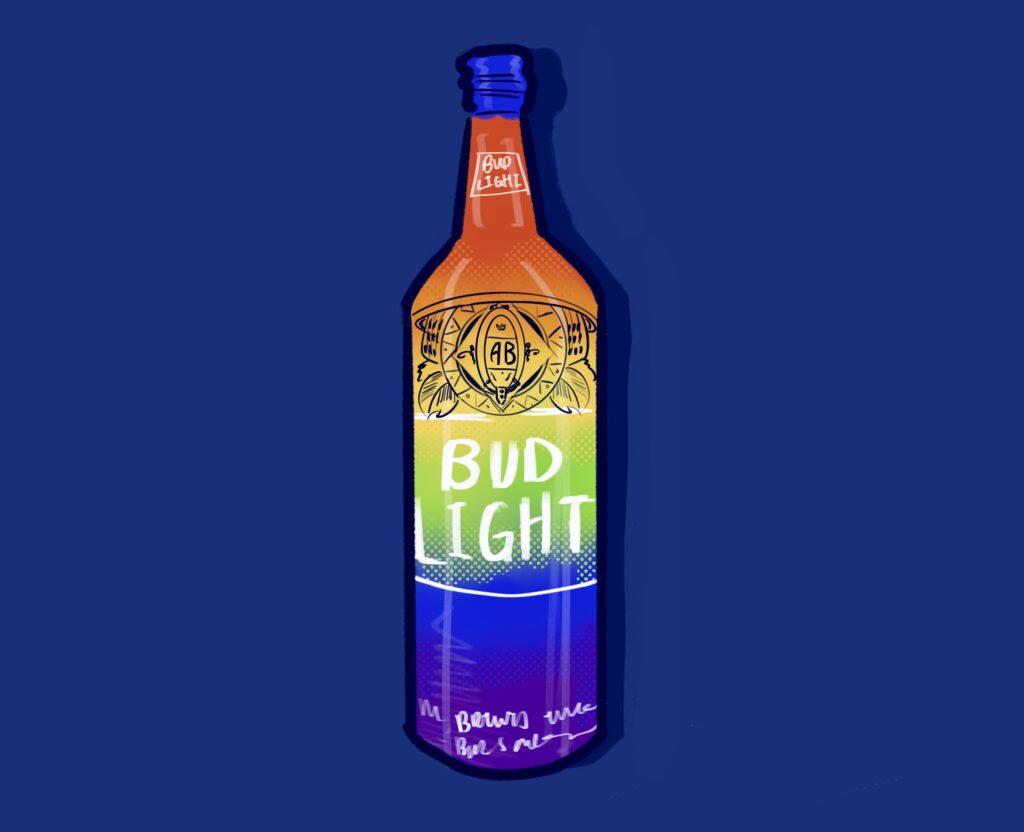Imagine making an advertisement for one of the largest companies in the world, and then getting backlash so aggressive you had to fear for your life. This was the harrowing reality for transgender influencer and TikTok star Dylan Mulvaney after promoting Bud Light in a controversial advertisement.
On April 1, Mulvaney, who had 10.7 million TikTok followers, released an advertisement for Bud Light on her 365th day identifying as a female. The contents of the ad were a simple endorsement of the beverage to support the final games of March Madness, but it caught the eye of many conservative influencers, including Ben Shapiro, one of the right’s main voices and podcasters.
Conservatives called for a boycott of the brand. Soon after, a viral video of American singer Robert James Ritchie, more commonly known as Kid Rock, showed him shooting up cases of Bud Light with an Ar-15. Singer Garth Brooks, who supported LGBTQ+ movements, was criticized on social media for mentioning that his bar would continue to serve Bud Light.
On July 12, Mulvaney released a TikTok video from Peru where she said, “It’s sad I had to leave my country to feel safe,” alluding to widespread transphobia and death threats.
The backlash is far more overblown than it should be. The hate that Mulvaney received was largely a result of angry influencers choosing to dogpile pent-up anger regarding the LGBTQ+ movement on the company without a truly valid reason.
The support of LGBTQ+ influencers is a step in the right direction, and Mulvaney is not at fault. There’s absolutely nothing wrong with advertising for a company that supported her community. However, given that Anheuser-Busch, Bud Light’s parent company, has largely kept silent about the topic, it’s clear that the company doesn’t want to risk any more economic damage.
After sponsoring Mulvaney, Anheuser-Busch is obligated to stand and protect her. If executives were planning to support her only to the extent that they wouldn’t come under criticism, they shouldn’t have offered the opportunity in the first place.
After the endorsement, Bud Light’s retail sales dropped 26%, taking it out of the spot as America’s No. 1 best selling beer. Compared to the same quarter last year, the company’s revenue has fallen nearly $400 million, not to mention Anheuser-Busch’s market value dropping $28.7 billion.
Ironically, as a result of the boycott, consumers have begun to buy more Coors Light, which has been supporting the LGBTQ+ community for more than two decades. It seems these consumers are listening more to mass media and influencer opinions, rather than doing their own research into each company before they buy.
This approach of bandwagoning on trends based on incomplete information from social media is ultimately dangerous to both consumers and companies. Often biased and unreliable sources such as Twitter, Instagram or TikTok should not be considered “news sources,” at least not without cross-checking. It’s difficult to regulate social media, so the burden of confirming truth lies upon us.
Consumers making rash decisions based on one advertisement makes our society run towards decisions that might not be well thought out. As customers, we need to take the time to consider which companies we support.
This incident is just another reminder that the oversensitive cancel culture developed through social media and media generally is toxic. While cancel culture is typically associated with left-wing criticism of “racist” remarks, it’s actually just a result of widespread fear mongering that isn’t specific to one side. The growth and criticism of “woke” culture, such as this Bud Light incident, is another example of how the right and left wings are constantly at odds with each other.
Today, social media, influencers and cancel-culture run rampant on both the political left and right, limiting growth and forcing companies to be extra cautious with every action they take. Instead of jumping to rash conclusions, consumers need to consider the full picture.



























